[ X-Files DVD ] [ Roswell DVD ] [ Stargate DVD ] [ UFO the series DVD ] [ Battlestar Galactica DVD ] [ More Series DVD ]
[ Stargate DVD 2 ]
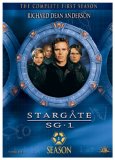 |
Stargate SG-1 Season 1 (Thinpak) (1997) (DVD)Starring: Richard Dean Anderson, Michael Shanks Director: Peter DeLuise, Andy Mikita |
| General Hammond summons Colonel Jack O'Neill out of retirement to embark on a secret rescue mission. O'Neill confesses that he disobeyed orders to destroy the Stargate on Planet Abydos, and that scientist Daniel Jackson may still be alive. Arriving on Abydos with his team, O'Neill meets up once again with the scientist, who has discovered a giant elaborate cartouche in hieroglyphics. All signs point to the fact that this is a map of many Stargates that exist throughout the galaxy - a development that makes the dream of the SG-1 team to travel throughout the universe in time a reality. | |
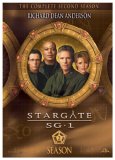 |
Stargate SG-1 Season 2 (Thinpak) (1997)Starring: Richard Dean Anderson, Michael Shanks Director: Peter DeLuise, Andy Mikita |
| There have over the years been a number of great shows that followed a good first season with a great second one, including THE X-FILES, BUFFY THE VAMPIRE SLAYER, and FARSCAPE. There are a variety of reasons for this in each case. With STARGATE, it is the increasingly complex storyline about the relations between various races and cultures with access to stargates. Season One was basically your stargate-of-the-week format, each week an individual adventure with no real connections with any other episode. This is the format usually preferred by network executives, since it allows new viewers to join a show without much background. Serious fans, on the other hand, vastly prefer the complex storylines, where each week's episode does not stand on its own, but is embedded in an ongoing saga, almost like a chapter in a huge novel. This has been and probably will continue to be an ongoing struggle between the creative talent and the network bureaucracy, though my own hope is that the success of shows like LOST will pave the way for more complex formats. | |
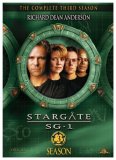 |
Stargate SG-1 Season 3 (Thinpak) (1997)Starring: Richard Dean Anderson, Michael Shanks Director: Peter DeLuise, Andy Mikita |
| Season Three of STARGATE SG-1 continued the excellent precedent established in Season Three by each week continuing the story of Stargate Command's exploration of the universe via wormholes created by an ancient system of stargates. I have for several years been especially interested in the way that post-HILL STREET BLUES television shows negotiate issues concerning narrative (that being the first non-soap to be structured around ongoing story arcs). The approach that STARGATE takes in Season Three is fairly unique. Most shows tend not to wrap up all narrative tension each week and frequently pick up in one episode what happened in the previous one. Most episodes of STARGATE in Season Three begin with a relative ignorance of what happened in the previous episode and ends by resolving most of that week's narrative tension. Contrast this with FARSCAPE or BUFFY THE VAMPIRE SLAYER or LOST where episodes frequently begin by referring to what happened in the previous week's episode. Nonetheless, STARGATE does not resemble any other shows that resolve most narrative issues each week, in that most Season Three episodes refer to previous episodes. Most shows employing the long narrative format deal with several threads in each episode. STARGATE usually deals with one thread, but loves to pick up on stories from one or two previous episodes. Season Three on the other hand featured very few episodes that were completely stand-alone. I'm not aware of another show that so consistently in any one season used such a method. Even in Season Two STARGATE tended to let episodes run over from week to week. | |
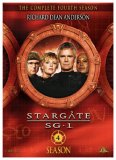 |
Stargate SG-1 Season 4 (Thinpak) (1997)Starring: Richard Dean Anderson, Michael Shanks Director: Peter DeLuise, Andy Mikita |
| Season Four is in many ways the most difficult to assess of the show's first four. On the one hand it features a number of absolutely first rate individual episodes, but on the other the larger narrative was developed far less than in seasons two and three. Almost always such lack of development is the result of network pressures to produce a show that was easier for first-time viewers to access. Seasons Two and Three saw a vast amount of plot development, as new races and characters were introduced with increasing rapidity. Season Four cut back on this tremendously, and the overall arc proceeded at a much slower pace. | |
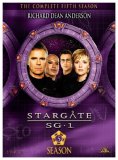 |
Stargate SG-1 Season 5 (Thinpak) (1997)Starring: Richard Dean Anderson, Michael Shanks Director: Peter DeLuise, Andy Mikita |
| I have an extremely conflicted relationship with STARGATE SG-1. On the one hand, I think it one of the most consistently entertaining shows on TV, almost always featuring very strong individual episodes with remarkably few truly awful episodes. Although THE X-FILES was a much greater series than STARGATE SG-1, it probably had far more truly weak episodes (although it also had many more truly great ones). STARGATE SG-1's greatest virtue is its amazing consistency. Given that it is now heading into its tenth season, its track record for steadily solid episodes is almost without precedent. On the other hand, there was after Seasons Two and Three an opportunity to do something extraordinary, the potential for true greatness. In those two seasons it appeared that the show was going to embrace the long story arc format with one episode after another spilling into the next. Unfortunately, that did not occur. Luckily the show does possess a memory, and frequently builds new episodes on previous episodes. But in the end its narrative is more like STAR TREK: THE NEXT GENERATION instead of FARSCAPE or FIREFLY. When I reflect on how good the individual episodes are, I inevitably wonder just how good the show could have been if in Seasons Four and Five they had fully embraced the long narrative format. | |
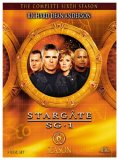 |
Stargate SG-1 Season 6 (Thinpak) (1997)Starring: Richard Dean Anderson, Michael Shanks Director: Peter DeLuise, Andy Mikita |
| The first five seasons of STARGATE SG-1 were notable for their remarkable consistency not only in quality but in style and substance. There was, in fact, little actual variation. But Season Six brought some major changes. First, Michael Shanks took a year off from the show to pursue his own projects, though he did reappear in a few episodes either as Daniel Jackson or as the voice of Thor. Second, Daniel Jackson's place was taken by Corin Nemec as Jonas Quinn, who had appeared in a Season Five episode as a denizen of another planet. Third, for much of the season the show abandoned episodes that involved them exploring new planets. They didn't completely skip visiting other worlds, but they did far less than in previous seasons. |